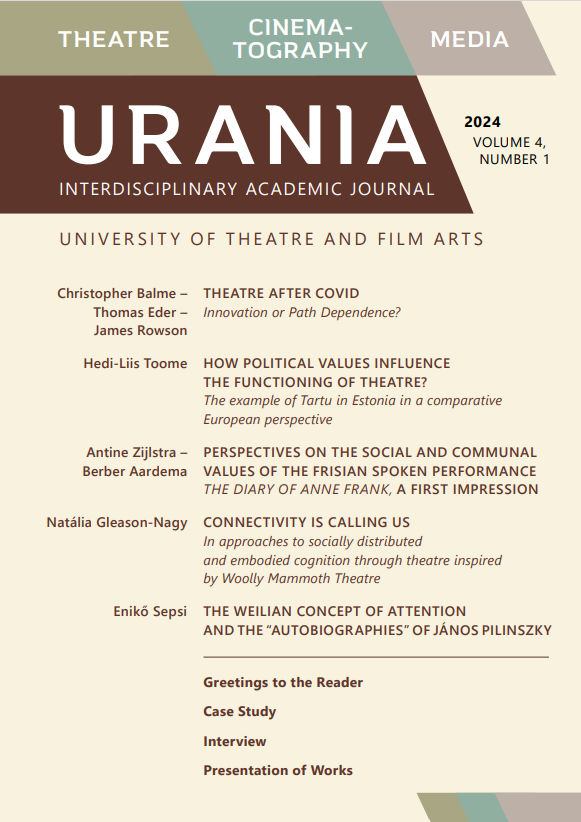Connectivity is calling us
In approaches to socially distributed and embodied cognition through theatre inspired by Woolly Mammoth Theatre
Abstract
This article intends to serve as a case study and inspiration in the field of audience engagement and community experience and invites international exchange & discussions on best practices and experimental praxises. It briefly examines the cultural history and context that preceeded Connectivity. Then sets out to illustrate with examples how the aim of the Connectivity department is to forge dynamic and multifaceted bilateral relationship between the theatre—Woolly Mammoth Theatre Company specifically—and her community in Washington, D.C. Each play programmed has a constellation of curated experiences designed to engage, explore and educate: from open first reads, to interactive lobby displays, to post show events, the theatre seeks relentlessly how to best facilitate the encounters that strengthten and enrich lifes in and with the arts. By bringing the concept of Connectivity to a continental readership, the article invites us to examine the function and potentiality of our institutions in the civic and cultural landscape they serve and thereby extend our notions of cultural leadership by offering a variety of approaches to invite, engage and sustain audience participation beyond spectatorship.
References
Anderson, Miranda. 2015. The Renaissance Extended Mind. New Directions in Philosophy and Cognitive Science. Edinburgh, UK: Palgrave Macmillan.
Bloomfield, Sara J. 2018. “Why History Matters More than Ever.” Memory & Action Volume 6: No. 2. Online access: https://www.ushmm.org/m/pdfs/2018_SPRING_ANNIV_Magazine_to_post.pdf (last visited: December 11, 2023).
Crowley, Patrick Abram. 2020. Drawn from the Well of the People: The Living Stage Theatre Company and Their Groundbreaking Community-Based Practice. PhD diss. University of Maryland.
Gamble, Jamie. 2014. Innovation Lab for the Performing Arts Case Studies in Innovation and Adaptive Capacity. Online access: https://www.artsfwd.org/wp-content/uploads/2014/03/EmcArts-ImpactStudies-March2014.pdf (last visited: December 9, 2023).
„Goals of the Publicly Engaged Humanities.” Humanities for All. Online access: https://humanitiesforall.org/essays/goals-of-the-publicly-engaged-humanities (last visited: December 9, 2023).
Rokotnitz, Naomi. 2001. Trusting Performance: A Cognitive Approach to Embodiment in Drama (Cognitive Studies in Literature and Performance). London: Palgrave Macmillan, 2001.
Shalwitz, Howard. 2013. „The Citizenship and the Arts Talk Series.” Filmed October 22, 2013 at the National Innovation Summit for Arts & Culture, Denver, Co. Video, https://www.artsfwd.org/finding-your-itch




